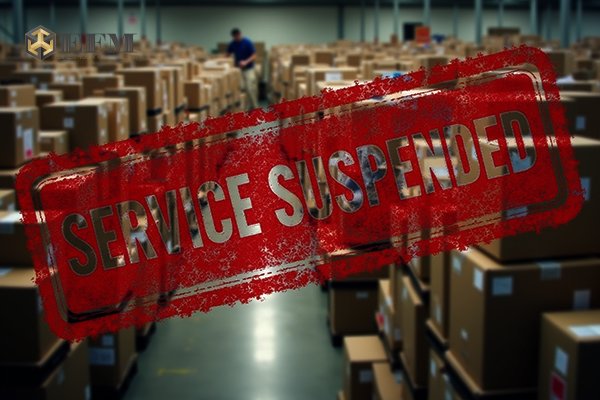
Freight News
De Minimis Rule Sparks Postal Suspension

Postal operators in at least 25 countries have announced the suspension of services for most goods being shipped to the United States. This comes in response to the elimination of the “de minimis” trade rule, effective August 29, 2025.
De Minimis
The “de minimis” provision, first established in the Tariff Act of 1930 and formalized in 1938 with a $1 threshold, was designed to save the government the cost of collecting duties on trivial imports. The threshold was periodically raised, reaching $200 in 1993 before the Obama Administration drastically quadrupled it to $800 in 2016 as part of the Trade Facilitation and Trade Enforcement Act.
While proponents at the time touted the move as a way to streamline e-commerce, it effectively opened the floodgates for foreign companies to ship billions of dollars in goods directly to U.S. consumers without facing the same tariffs and taxes paid by domestic retailers.
The consequences of the 2016 decision were immediate and profound. The volume of de minimis shipments exploded from 224 million in 2016 to over 1.3 billion by 2024. This surge overwhelmingly benefited e-commerce giants and factories based in China, allowing them to undercut American companies that are required to pay duties on imported goods and materials.
NOTE: The elimination of this tariff loophole follows an earlier suspension of the rule for China and Hong Kong in May 2025.
Postal Suspension

The abrupt policy shift has left international postal operators in a state of operational uncertainty. The Universal Postal Union (UPU), a United Nations agency, confirmed it had received notifications of service suspension from 25 member countries. In statements, postal services from nations such as Germany, France, Japan, and Australia said that U.S. authorities had not provided clear guidelines or sufficient time to implement the complex new procedures for collecting advance customs duties from senders.
The suspensions primarily affect packages containing goods. Most carriers have specified that letters, documents, and, in some cases, gift items valued under $100 will continue to be accepted. The halt impacts a wide array of countries, including:
- Europe
- Austria
- Belgium
- Czech Republic
- Denmark
- Finland
- France
- Germany
- Ireland
- Italy
- Netherlands
- Norway
- Poland
- Portugal
- Russia
- Spain
- Sweden
- Switzerland
- United Kingdom
- Asia-Pacific and the Americas
The disruption is poised to have a significant impact on international e-commerce, affecting small businesses and consumers who have come to rely on the seamless flow of low-value goods. Postal operators have stated the suspensions are indefinite and will remain in place until they can adapt their systems and receive clear operational guidance from the United States.
Logistics Impact

Beyond the immediate logistical nightmare of delayed packages and broken supply chains, the widespread suspensions serve as a stark and unavoidable reminder of the long-term consequences of a trade policy that prioritized the convenience of foreign e-commerce over American economic security. The 2016 decision to raise the de minimis threshold to $800 was not merely a technical adjustment; it created a gaping loophole in the nation’s trade defenses.
As postal carriers effectively give up in the face of regulatory change, the crisis casts a harsh spotlight on the indispensable value of professional logistics services, particularly the role of freight forwarding.
Freight Forwarding

The core function of a freight forwarder is not merely to move a box, but to navigate the labyrinth of international customs, tariffs, and compliance paperwork. While postal services have been stymied by the challenge of collecting duties in advance, this is a standard, everyday procedure for forwarders who offer services like Delivered Duty Paid (DDP), ensuring shipments arrive at the customer’s door with all costs and regulatory hurdles already handled.
Freight forwarders offer a vital lifeline to operational continuity. Key benefits now coming to the forefront include:
- Customs and Compliance Mastery
- Forwarders act as customs clearance experts, managing the precise documentation and duty collection that has overwhelmed the postal network. The end of “de minimis” is not a system-breaking event for them, but simply a change in the rules they are paid to manage.
- Further Reading: The Importance of Accurate Documentation in Customs Clearance
- Shipment Consolidation
- Rather than sending countless individual packages to face customs one by one, forwarders can consolidate goods from multiple suppliers into a single, larger shipment. This streamlines the import process, provides clearer visibility, and creates a more manageable and predictable cost structure for duties and taxes.
- Network Diversification
- Unlike the singular, now-broken postal channel, freight forwarders leverage a diverse network that includes air freight, sea freight, and trucking. They provide the flexibility to keep goods moving, ensuring that a disruption in one part of the system doesn’t mean a complete shutdown of business.
- Further Reading: Air Freight vs Sea Freight
Conclusion
In summary, the preemptive shutdown of postal services by at least 25 nations marks a pivotal and disruptive moment in global commerce. The inability of international postal operators to adapt to the new regulatory landscape has paralyzed a critical supply chain, leaving countless American businesses and consumers stranded.
This situation also reveals the risks of relying too heavily on the postal system for international commerce. The era of exploiting trade loopholes is ending, and in its place, a new emphasis on professional, resilient logistics is emerging. For American businesses to succeed in this new environment, partnering with expert freight forwarders who can navigate complex customs, consolidate shipments, and ensure compliance is no longer an option, but a fundamental necessity for survival and growth.
For nearly two decades, Express Freight Management has been the trusted partner for businesses shipping between the United States and Southeast Asia. We handle the technological complexity for you, managing everything from carrier selection and customs clearance to warehousing. Discover a streamlined approach to logistics with Express Freight Management for your shipping needs between the United States and Brunei, Cambodia, Indonesia, Laos, Malaysia, Myanmar, Philippines, Singapore, Thailand, and Vietnam today!
